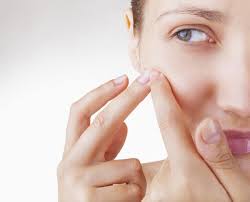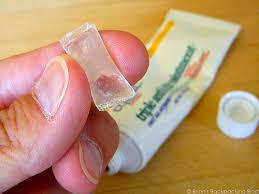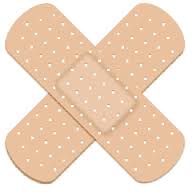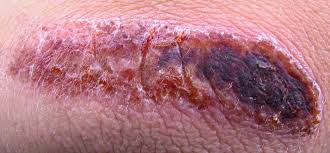The crusty barrier which develops as a protective cover over any damaged or broken skin, scratch or wound is known as a scab. Whenever there is any damage to the skin, which acts as a defence barrier, the body quickly sends platelets, fibrin and clotting factors to the site of damage and a blood clot is formed. The dried clot becomes a scab while the skin underneath it repairs itself.
Why Your Scab Won't Heal and What to Do
Scabs heal naturally, if your scab won't heal, there may be many reasons. First you need to make sure that there is not chaffing or rubbing done by any piece of clothing. If the scab is on the face, it is very likely that you have been scratching it without even noticing what you are doing. There might be damage to the scab while shaving or bathing. So first you need to rule out these things.
If you scab won't heal, there're some ways to speed up recovery.
1. Warning: Keep Your Hands Off the Scab

The scab can itch and it is very hard to resist this itching without scratching or picking. Be very careful as this can lead to infection and slow healing. The skin undergoing repair beneath the scab is very delicate and if you pick on a scab, there are chances that the new skin can be damaged and if you keep on scratching or picking at it, it will become a scab that won't heal fast. To control the itch, you can apply certain creams and ointments. They will keep the surrounding skin moist and reduce the itching.
2. Apply Anti-Bacterial Ointments

It is a good idea to apply some anti-bacterial ointment on the scab. The best thing is to keep the area clean and dry. You can wash it without rubbing it excessively and let it dry. Once it is dry, apply a little bit of ointment evenly. Do not put big blobs of cream or ointment on the scab as it can make the scab soft and delay healing.
3. Avoid Covering a Scab

Just leave the scab open and keep it dry. The only times a wound or scab needs to be covered in bandages or plaster is when it is bleeding, oozing or there is any infection. A dry and intact scab protects the underlying skin which is in the process of healing. If it gets wet or there is a crack in it, bacteria can go through and can cause infection. If the scar is on the face, avoid covering it with any sort of base or concealer. Putting make up on a scab can lead to infection and scarring.
4. Give It Some Time

Be patient. The body will take its time to heal things naturally. What you can do is have a healthy and balanced diet so all the micronutrients for a speedy recovery are present in your blood. Certain vitamins and minerals like vitamin C, D, E, folic acid, calcium and fish oil can boost the immune system and promote healing.
Could It Be Skin Cancer?
There are few circumstances when a scab that won't heal is a sign of something serious like skin cancer. A non-healing scab that bleeds repeatedly and never completely heals needs to be investigated. Following are some signs which need immediate medical attention and evaluation.
- If there is any change in any mole or appearance of a new mole on the body with irregular shape or texture or a rapid change in size.
- Any wound or scab that can't heal for a very long time. You have to examine your whole body including the inside of your mouth, scalp, palms, soles, genital area, skin folds like arm pits and between the buttocks and if there is a suspicious scab or wound, contact your doctor urgently.
Related reading: What Does Skin Cancer Look Like?
Types of Wounds That Won't Heal
Small wounds heal within a couple of weeks, a wound which does not heal for three months or more is known as a chronic wound. These can vary in size and shape and may get a scab repeatedly but fail to completely heal. If you have any sore which is not getting better contact your doctor urgently for proper evaluation and treatment.
Common types of chronic wounds are:
1. Diabetic Ulcers
Diabetics are at the greatest risk of developing long standing sores. The main reasons are an increased susceptibility to infections, poor blood supply and loss of sensations due to neuropathy. All the factors lead to slow healing.
If you are a diabetic and have any wound which is not getting better or a scab that won't heal, you need urgent medical advice. Proper nutrition, strict control of blood sugar levels, adequate nutrition and avoidance of infection are key factors in management of these sores.
2. Venous Leg Ulcers
These are formed when there is excessive accumulation of fluid in the legs and that fluid puts pressure on the skin and an ulcer can be formed. These are painful, itchy and very slow to heal and the area surrounding them can be discolored. Leg swelling can be a sign of many serious diseases and must be investigated.
The main treatment option is compression stockings while in some cases vascular surgery may be required.
3. Pressure Ulcers
As the name suggests, pressure ulcers develop when there is constant pressure on a body area. These are very common in bed ridden or wheel chair bound patients. The constant pressure on any area, especially the back, feet or buttocks can compress the small blood vessels leading to a decreased blood supply to that area which eventually results in an ulcer formation.
These ulcers can be large and difficult to treat if get infected. The best thing is to take care and prevent them before they appear. Special care should be taken for patients at risk of developing a pressure sore. Frequent turning, change of posture and special mattresses are recommended to prevent them.
